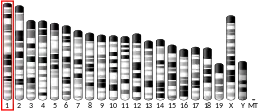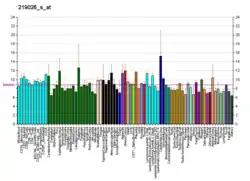RASAL2
Ras GTPase-activating protein nGAP is an enzyme that in humans is encoded by the RASAL2 gene.[5][6]
| RASAL2 | |||||||||||||||||||||||||||||||||||||||||||||||||||
|---|---|---|---|---|---|---|---|---|---|---|---|---|---|---|---|---|---|---|---|---|---|---|---|---|---|---|---|---|---|---|---|---|---|---|---|---|---|---|---|---|---|---|---|---|---|---|---|---|---|---|---|
| Identifiers | |||||||||||||||||||||||||||||||||||||||||||||||||||
| Aliases | RASAL2, NGAP, RAS protein activator like 2 | ||||||||||||||||||||||||||||||||||||||||||||||||||
| External IDs | OMIM: 606136 MGI: 2443881 HomoloGene: 35217 GeneCards: RASAL2 | ||||||||||||||||||||||||||||||||||||||||||||||||||
| |||||||||||||||||||||||||||||||||||||||||||||||||||
| |||||||||||||||||||||||||||||||||||||||||||||||||||
| |||||||||||||||||||||||||||||||||||||||||||||||||||
| |||||||||||||||||||||||||||||||||||||||||||||||||||
| |||||||||||||||||||||||||||||||||||||||||||||||||||
| Wikidata | |||||||||||||||||||||||||||||||||||||||||||||||||||
| |||||||||||||||||||||||||||||||||||||||||||||||||||
This gene encodes a protein that contains the GAP-related domain (GRD), a characteristic domain of GTPase-activating proteins (GAPs). GAPs function as activators of Ras superfamily of small GTPases. The protein encoded by this gene is able to complement the defective RasGAP function in a yeast system. Two alternatively spliced transcript variants of this gene encoding distinct isoforms have been reported.[6]
References
- GRCh38: Ensembl release 89: ENSG00000075391 - Ensembl, May 2017
- GRCm38: Ensembl release 89: ENSMUSG00000070565 - Ensembl, May 2017
- "Human PubMed Reference:". National Center for Biotechnology Information, U.S. National Library of Medicine.
- "Mouse PubMed Reference:". National Center for Biotechnology Information, U.S. National Library of Medicine.
- Noto S, Maeda T, Hattori S, Inazawa J, Imamura M, Asaka M, Hatakeyama M (Jan 1999). "A novel human RasGAP-like gene that maps within the prostate cancer susceptibility locus at chromosome 1q25". FEBS Lett. 441 (1): 127–31. doi:10.1016/S0014-5793(98)01530-0. PMID 9877179.
- "Entrez Gene: RASAL2 RAS protein activator like 2".
Further reading
- Maekawa M, Nakamura S, Hattori S (1993). "Purification of a novel ras GTPase-activating protein from rat brain". J. Biol. Chem. 268 (30): 22948–52. doi:10.1016/S0021-9258(18)41618-3. PMID 8226805.
- Bonaldo MF, Lennon G, Soares MB (1997). "Normalization and subtraction: two approaches to facilitate gene discovery". Genome Res. 6 (9): 791–806. doi:10.1101/gr.6.9.791. PMID 8889548.
- Seki N, Ohira M, Nagase T, et al. (1998). "Characterization of cDNA clones in size-fractionated cDNA libraries from human brain". DNA Res. 4 (5): 345–9. doi:10.1093/dnares/4.5.345. PMID 9455484.
- Strausberg RL, Feingold EA, Grouse LH, et al. (2003). "Generation and initial analysis of more than 15,000 full-length human and mouse cDNA sequences". Proc. Natl. Acad. Sci. U.S.A. 99 (26): 16899–903. Bibcode:2002PNAS...9916899M. doi:10.1073/pnas.242603899. PMC 139241. PMID 12477932.
- Ota T, Suzuki Y, Nishikawa T, et al. (2004). "Complete sequencing and characterization of 21,243 full-length human cDNAs". Nat. Genet. 36 (1): 40–5. doi:10.1038/ng1285. PMID 14702039.
- Bouwmeester T, Bauch A, Ruffner H, et al. (2004). "A physical and functional map of the human TNF-alpha/NF-kappa B signal transduction pathway". Nat. Cell Biol. 6 (2): 97–105. doi:10.1038/ncb1086. PMID 14743216. S2CID 11683986.
- Jin J, Smith FD, Stark C, et al. (2004). "Proteomic, functional, and domain-based analysis of in vivo 14-3-3 binding proteins involved in cytoskeletal regulation and cellular organization". Curr. Biol. 14 (16): 1436–50. doi:10.1016/j.cub.2004.07.051. PMID 15324660. S2CID 2371325.
- Gregory SG, Barlow KF, McLay KE, et al. (2006). "The DNA sequence and biological annotation of human chromosome 1". Nature. 441 (7091): 315–21. Bibcode:2006Natur.441..315G. doi:10.1038/nature04727. PMID 16710414.
- Olsen JV, Blagoev B, Gnad F, et al. (2006). "Global, in vivo, and site-specific phosphorylation dynamics in signaling networks". Cell. 127 (3): 635–48. doi:10.1016/j.cell.2006.09.026. PMID 17081983. S2CID 7827573.
This article is issued from Wikipedia. The text is licensed under Creative Commons - Attribution - Sharealike. Additional terms may apply for the media files.




